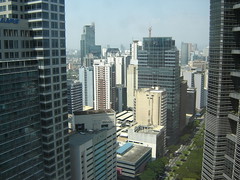greens heart cities
Or why environmentalists should learn
to love Metro Manila
Do you consider yourself an environmentalist? Do you like the great outdoors and natural landscapes? Do you want to preserve them? -- Then you should be concerned about our cities and should be committed to making them better places to live:
The NYT's Dot Earth blog neatly sums up the reasons why:
Urban life can be productive and satisfying and is almost always much more efficient in terms of energy and land use. Families are smaller. Incomes can rise quicker. Wealth builds from the concentration of capital and enterprise. Pollution is concentrated, too, but that makes it easier to clean up once incomes grow enough to pay for municipal services. (That hasn’t happened yet in many developing-country cities.) -emphasis added- UDC
The post that comes from is about managing traffic in an urban age but that one paragraph should be read and re-read by every pinoy environmentalist.
Environmentalism is so often associated with pastoral or naturalistic scenes; with climbing Mt. Apo, Pinatubo or Makiling; with swimming with the whale sharks in Donsol or with diving and exploring the Tubataha reefs. But, sustainability must begin with cities. If we can manage our land consumption and clean up our cities, we will do so much more towards protecting our environment.
Next time you and your friends plan on an environmental education trek, don't bother to drive out all the way to the countryside. Plan a walking tour of your local metropolis, instead. And then ask yourselves, "What can we do to make life in the city more livable? What can we do to make Philippine urban development more sustainable?"
Image credit: Makati Skyline
by Manila Daily Photo
by Manila Daily Photo


5 comments:
Hi, UDC
Is this (I hope) pertinent?
An acquaintance sent me a link to a site with some interesting material. When I read the following passage, I had to copy it and send it to you:
"In The Death and Life of Great American Cities, Jane Jacobs argues that urban planning in America tends to fail when top-down plans to change the nature of neighborhoods are implemented. Most large projects designed to increase the quality of ghetto areas by building large apartment projects have not succeeded in their aim. Conversely, neighborhoods that have thrived have done so through a kind of emergence. She argues that the interaction between people on the sidewalks and streets creates a street culture and intelligence more suitable than central control for managing neighborhoods in cities, and that instead of bulldozing problems, city planners should study neighborhoods that work and try to mimic the conditions that produce the positive emergent behavior."
The item cited the following source: Jacobs, Jane. (1961). Random House, Inc. The Death and Life of Great American Cities.
The link to the article containing this piece is at
http://joi.ito.com/static/emergentdemocracy.html
I haven't finished reading all of it, but it appears the author is interested in developing a more responsive democracy. I hope you find it all worthwhile.
Fred
Welcome, Fred, to Jane Jacobs, one of the stars in the (urban planning) firmament.
She protected Greenwich Village in Manhattan against Robert Moses' megaprojects. (e.g.-the midtown highway) --and brought people (and yes, democracy) back into the planning process.
Her ideas have spawned Smart Growth, charrettes, Project for Public Spaces, and a thousand other groups concerned with putting people back into the center of cities.
Her other books would also interest you (particularly "The Economy of Cities").
You would also be interested in the work of William H. Whyte and Jan Gehl.
UDC
Being a probinsyano, I'd still prefer to get my nature fix from the rustic charm of the province. However, I recently got to walk around Makati CBD (not during rush hour) and realized that the greenery there made the area walkable and breathable.
True True. Many greenies like to look at only their interpretation of what being an environmentalist is. Some are anti development without understanding the true cost of sustainable development. High Rise versus Sprawl or Exclusive Low Density Gated Communities versus High Density Neighborhoods are many times analyzed from very simplistic points of views like There are more trees in the villages (thank god for Ayala!) or Better to have houses with gardens than high rise condo's at least you see some green from you kitchen! Anyway the more a cities constituents are educated to address all issues from a wholistic point of view the better the results will be for such consensus driven societies like the Philippines.
Dave,
welcome to the power of microclimates which is what I always throw back at critics who say it is too hot to walk in Metro Manila.
Peter,
Hear, hear. Too often uniformed nimbyism masquerades as environmentalism.
And yes to the task of educating our citizens about our cities.
(pay attention, journalist friends!)
UDC
Post a Comment